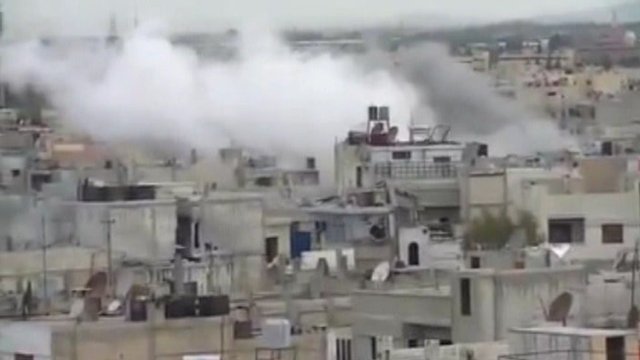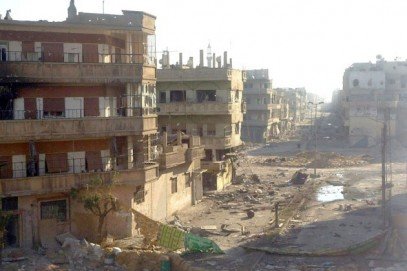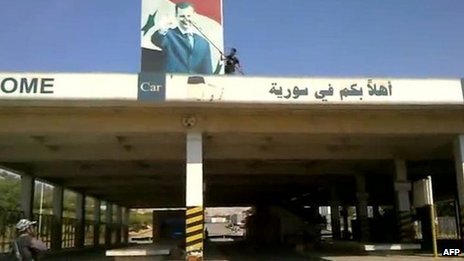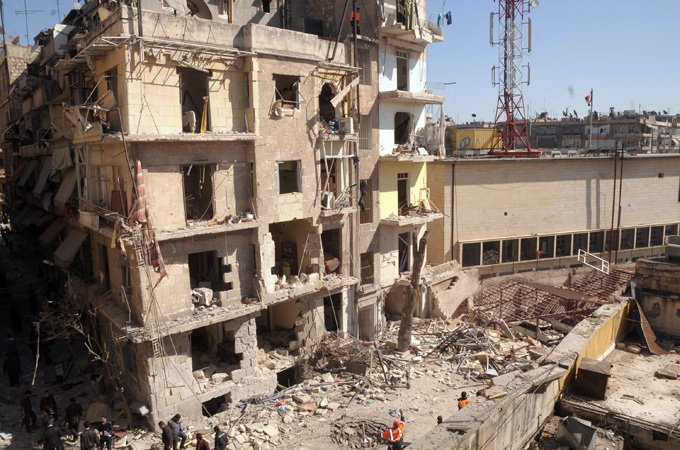Home Tags Posts tagged with "Damascus"
Damascus
United Nations announces that some 200,000 people have fled intense fighting in Syria’s second city Aleppo in the past two days.
UN humanitarian chief Baroness Valerie Amos said others were trapped in the city and needed urgent help.
Government forces launched a ground assault on Saturday after a week of sporadic shelling and sorties by fighter jets.
Residents are facing food shortages and power cuts.
The rebels are outgunned by the army, but they are fighting an effective guerrilla war in the streets.
Fighting has focused on the Salah al-Din neighborhood in Aleppo’s south-west, where the rebels had embedded themselves.
Syrian state television showed footage from the city and interviewed soldiers who said they had taken complete control of Salah al-Din late on Sunday.
On Monday, officials in Damascus again said they had “purged” the area.
But activists have denied that the quarter has been overrun by the army, saying rebels are still in control.
They said fighting was continuing on Monday.
They also reported heavy shelling and clashes at the Sakhur quarter on the north-east side of the city centre, where another attack by government forces appeared to be under way.

United Nations announces that some 200,000 people have fled intense fighting in Syria's second city Aleppo in the past two days
Baroness Amos, speaking in New York, said that the Red Cross and the Syrian Arab Red Crescent estimated 200,000 people had fled the fighting in the past two days.
“It is not known how many people remain trapped in places where fighting continues today,” she said.
“I call on all parties to the fighting to ensure that they do not target civilians and that they allow humanitarian organizations safe access.”
She said many people had fled their homes to take shelter in schools and other public buildings.
Analysts say many others will have gone to nearby villages, and others will have fled across the border with Turkey.
The UN Security Council is chronically divided over Syria, with Russia blocking attempts by Western nations to ramp up pressure on President Bashar al-Assad.
France is due to take over the presidency of the Security Council this week, and Foreign Minister Laurent Fabius has pledged to continue pushing the issue.
He called Bashar al-Assad an “executioner” and said he would ask for a ministerial level meeting of Security Council members before the end of the week.
US Defence Secretary Leon Panetta, who is on a five day Middle East tour, has also heavily criticized the government’s assault on Aleppo.
He said the attack would be “a nail in the coffin” of President Bashar al-Assad.
Leon Panetta will visit Tunisia, Egypt, Israel and Jordan in a bid to reinforce the view that Bashar al-Assad must step down.
Where Syrians are fleeing:
• Turkey: 43,387
• Jordan: 36,824
• Lebanon: 31,596
• Iraq: 8,445
• Internally displaced: One million
Source: UNHCR
In other developments:
• A Turkish official tells Reuters news agency that 12 police officers, including the chief of Latakia city’s force, have fled over the border.
• The Turkish army has sent reinforcements including missile batteries to the Syrian border, state-run Anatolian news agency reports.
New fighting is reported in Syria’s two biggest cities – Damascus and Aleppo – as government forces seek to regain control of rebel-held areas.
The army’s elite fourth division, backed by helicopters, has reportedly launched an assault on the capital’s north-eastern suburb of Barzeh.
Troops were also said to have deployed in the western suburb of Mezzeh.
Fighting also continued for a third day in Aleppo, where activists said a building had collapsed under tankfire.
The violence follows a week in which rebels made major advances, taking control of several parts of Damascus, seizing border crossings and claiming an attack that killed four top security officials, including the defence minister and President Bashar al-Assad’s brother-in-law.
Meanwhile, the UK-based Syrian Observatory for Human Rights has reported that at least 19,106 people had been killed since March 2011.
They included 13,296 civilians, including those who had taken up arms, as well as 4,861 security personnel and 949 army defectors, it said.
The UN said in May that at least 10,000 people had been killed, while in June the Syrian government reported that 6,947 Syrians had died, including at least 3,211 civilians and 2,566 security forces personnel.

New fighting is reported in Syria's two biggest cities, Damascus and Aleppo, as government forces seek to regain control of rebel-held areas
The government forces seem determined to drive the rebel Free Syrian Army (FSA) completely out of Damascus and are setting about it quite systematically.
Having regained one district close to the centre of the capital and another on its north-eastern edge, troops are now focusing on Mezzeh and Barzeh.
The attack on Barzeh by the army’s fourth division, which is commanded by the president’s brother Maher, had sent residents fleeing from the area, the Syrian Observatory reported.
Helicopter gunships were firing rockets and snipers were deployed on rooftops, the group’s director, Rami Abdul Rahman, told the AFP news agency.
State television later denied reports that helicopter gunships were being used in the assault. But pictures it broadcast of captured districts showed huge destruction, which activists say was cause by massive bombardments.
State TV also showed pictures of many bodies of what it called “terrorists” killed in the counter-attacks, as well as quantities of weapons and ammunition it said were seized.
Clearly, our correspondent says, in a straight fight, the lightly armed rebels are no match for the massive firepower and greater manpower of the state’s forces.
Reports from activists in Aleppo said there had been more clashes during the night and on Sunday morning between the rebel Free Syrian Army (FSA) and security forces.
They said a building in the Seif al-Dawla district collapsed under tank fire.
Residents also told the Reuters news agency that rebels were fighting government forces near the headquarters of an intelligence agency in the city centre.
An Aleppo-based activist, Mohammed Saeed, said rebels were still in control of the central Salah al-Din district and nearby Sakhour.
“Aleppo is witnessing serious street battles,” he told the Associated Press.
Mohammed Saeed also said there had been clashes on the road leading to the city’s international airport, as rebels tried to prevent military reinforcements being flown in.
State TV played down the scale of the violence, saying troops were merely hunting down “terrorists”.
The commander of FSA forces in Aleppo province has vowed to “liberate” the whole city.
In a video posted online, Col. Abdul Jabbar Mohammed Aqidi also called on government troops to defect to the opposition, and said the FSA would protect members of the president’s minority Alawite sect, saying: “Our war is not with you but with the Assad family.”
There were also reports of violence in the eastern city of Deir al-Zour on Sunday. Witnesses told Reuters that it was being attacked with artillery and rockets from helicopter gunships.
Rebels were now in control of the Bab al-Salam border crossing with Turkey. Turkey is not allowing non-Syrian nationals through so the border remains effectively closed.
President Bashar al-Assad was meanwhile shown on state TV receiving his new armed forces chief-of-staff, Gen Ali Abdullah Ayub, giving him his instructions, and wishing him success in his mission.
[youtube n0ZeKscjs7U]
Hisham Ikhtiar, Syria’s national security chief, has died from injuries he received in a bomb attack in Damascus on Wednesday, state TV has announced.
Hisham Ikhtiar is the fourth regime insider to die as a result of the attack at the national security bureau.
The army has fought off an assault by rebels in the Midan area of Damascus.
Meanwhile, Russia’s envoy to France has sparked a row with Damascus after suggesting President Bashar al-Assad was ready to step down.
Alexander Orlov said Bashar al-Assad had, in effect, agreed to step down last month at a conference in Geneva which had planned for a democratic transition.

Hisham Ikhtiar, Syria's national security chief, has died from injuries he received in a bomb attack in Damascus on Wednesday
“Assad nominated his representative to lead the negotiations with the opposition for this transition. That means he accepted to leave, but in a civilized way,” said Alexander Orlov.
His comments triggered an angry response from Syria, where the information ministry said the claims were completely baseless.
The announcement of Hisham Ikhtiar’s death came as the other victims of the bomb attack were buried.
The other three high-profile victims were the defense minister, his deputy who is also Bashar al-Assad’s brother-in-law, and a former defense minister.
The bombing of the National Security Bureau came shortly after rebels declared an all-out assault on the capital, calling it Operation Damascus Volcano.
Eruptions of violence have been seen across the city since Sunday.
In the latest fighting, state media announced the area of Midan had been “cleaned” of “terrorists”.
Rebels said they had withdrawn from Midan after coming under bombardment.
But elsewhere in the country rebel fighters have managed to seize control of several border posts, both on the southern frontier with Iraq and the northern border with Turkey.
Syrian rebels have captured a number of positions on the country’s borders with Iraq and Turkey.
A senior Iraqi official said all the crossings on Syria’s eastern frontier had been seized. At one point, two Turkish posts were also in rebel hands.
The push came a day after a bomb claimed the lives of three senior defence officials in Damascus.
At the UN, negotiations are under way on extending the mandate of the observer mission in Syria,
The mandate for the mission is due to expire on Friday.
There are almost 300 UN observers in Syria, but the mission suspended most of its monitoring activity in June, because of the risk from increasing violence.

Syrian rebels have captured a number of positions on the country's borders with Iraq and Turkey
The US says it might consider a final brief extension of the monitors work, but warned that it could not pin its policy on an unarmed mission.
The UK is proposing an extension for 30 days, and then the mission would continue only if the regime had removed heavy weapons from cities and sent troops back to their barracks.
The major Abu Kamal crossing on the Euphrates river in the east was captured after a clash with government forces, opposition activists said.
More than 20 Syrian soldiers and their commander were killed when a remote army outpost in the far north-east was attacked, Associated Press news agency reported.
Iraq’s government, seen as sympathetic to President Bashar al-Assad, has threatened to shut its side of the border and one official told Reuters news agency that it was closing the Abu Kamal crossing.
On the frontier with Turkey, too, rebels were said to have taken control of two posts, at Bab al-Hawa and Jarablus.
Video from the Bab al-Hawa crossing in Idlib province soon emerged of rebels defacing a portrait of President Assad, but they later reportedly withdrew from the position.
The regime’s grip on outlying areas may be slipping, which is hardly surprising given the fighting in Damascus.
State TV has been reporting on violence across the capital, showing footage of troops in the Midan area where it said 20 terrorists had been killed.
Analysts point out that the regime shows no signs of collapsing, and the military is still heavily armed, loyal and able to defend key institutions.
Violence broke out in the capital on Sunday, and two days later the rebels declared an all-out assault, calling it “Damascus volcano”.
The explosion on Wednesday that killed three top security officials led to a mobilization of government troops in an attempt to drive the rebels out of the city.
The president’s brother-in-law, the defence minister and head of the government’s crisis team were killed by a bomb as they attended a meeting at the national security headquarters.
The first images of President Bashar al-Assad since the attack have appeared, largely ending rumours he might have been hurt.
The footage appeared to show Gen Fahd Jassim al-Furayj, chief of staff of the armed forces, being sworn into his new post as defence minister.
Tanks and armored vehicles were reported to have moved into Qaboun on Thursday, close to the centre of Damascus.
There were heavy casualties, activists said, as a result of an army bombardment of Zamalka in the eastern outskirts of Damascus.
The London-based Syrian Observatory for Human Rights put the number of fatalities across the country on Thursday at 250.
The pace of events in Syria was in marked contrast to the diplomatic stalemate at the UN Security Council, where Russia and China vetoed a Western resolution calling for tougher sanctions on Damascus.
Under the Western-backed plan, the Damascus government would have been threatened with non-military sanctions under Chapter Seven of the UN Charter if it failed to move troops and heavy weapons from populated areas.
But the use of Chapter Seven paved the way for “external military involvement in Syrian domestic affairs”, Russia’s UN ambassador Vitaly Churkin argued.
Fresh fighting in many parts of Syria throughout the night has followed the deaths on Wednesday of three top regime figures in a suspected suicide attack.
Syrian government and opposition both said large numbers of people died, in one of the bloodiest days of the conflict.
Activists said artillery and helicopters were used in the worst attack, on a funeral south of Damascus.
The president’s brother-in-law, defence minister and head of Bashar al-Assad’s crisis team died in yesterday’s bombing.
Rebel groups said the bomb had been planted the day before the meeting at national security headquarters where it was detonated. They predicted the government’s imminent fall.
The army has pledged to rid Syria of “criminal and murder gangs”.
The London-based Syrian Observatory for Human Rights said on Thursday that more than 150 people had died across the country on Wednesday, in one of the worst days of a 16-month revolt.

Syrian government and opposition both said large numbers of people died on July 18, in one of the bloodiest days of the conflict
Video of one attack posted on the internet showed scenes of pandemonium after what activists said was a helicopter gunship attack on a funeral procession at Sitt Zeinab, south of the capital. They said at least 60 people were killed in this incident alone.
In Damascus, state media said, security forces launched operations in many areas which have been clashes in recent days, mainly in the south-west and north-east, killing many “terrorists”.
Activists reported more tanks moving towards the capital from the west.
Following Wednesday’s bombing, the government has vowed to root out ruthlessly what it describes as armed terrorists backed by outside powers.
The rebels are on the offensive too, warning state TV and radio to evacuate their personnel before its headquarters comes under attack.
In contrast with earlier explosions in Damascus, there were no photos or video from the scene of Wednesday’s blast at the security headquarters.
Among the victims were:
• Defence Minister and ex-chief of staff Gen Daoud Rajiha
• Deputy Defence Minister Assef Shawkat, married to Bashar al-Assad’s sister Bushra
• Assistant to the vice-president and head of crisis management office Gen Hassan Turkomani
• Two other senior officials – interior minister Mohammad Ibrahim al-Shaar and National Security Bureau chief Hisham Ikhtiar- were wounded
The US said the killings were a major blow to the regime.
“I think the incident today makes clear that Assad is losing control,” White House spokesman Jay Carney told reporters.
“All of our partners internationally need to come together to support a transition.”
In Lebanon, Hezbollah leader Hassan Nasrallah condemned what he termed a targeted killing: “We are going to miss them and we offer our condolences to the Syrian leadership and the Syrian army.”
Russia said some countries had incited the opposition rather than calming it down.
The attack prompted the UN Security Council to delay until Thursday a vote on a Western-sponsored resolution calling for tougher sanctions on Damascus.
UN Secretary General Ban Ki-moon said the Security Council must “shoulder its responsibility and take collective and effective action.
“Time is of the essence. The Syrian people have suffered for too long. The bloodshed must end now,” Ban Ki-moon said.
The mandate for the UN’s observer mission runs out on Friday. The resolution before the Security Council would extend the mission and place international envoy Kofi Annan’s peace plan under Chapter 7 of the UN Charter, which could ultimately authorize force.
But Russia is firmly against harsher measures. In a telephone conversation between President Barack Obama and President Vladimir Putin on Wednesday, the two leaders were said to be divided in their approaches to ending the bloodshed.
[youtube XJkGIksqt6Y]
[youtube _lZHby38jWU]
Fighting in Syria has become so widespread that the conflict is now in effect a civil war, says The Red Cross (ICRC).
The change in status means combatants will now be officially subject to the Geneva Conventions, leaving them more exposed to war crimes prosecutions.
The Red Cross had previously regarded only the areas around Idlib, Homs and Hama as war zones.
Meanwhile, Syrian officials are disputing claims that they used heavy weapons in fighting on Thursday.
Activists initially described fighting in the village of Tremseh near Hama as a massacre of dozens of civilians, but later accounts suggested most of the dead were armed rebels.

Fighting in Syria has become so widespread that the conflict is now in effect a civil war
The UN accused Syrian forces of using heavy artillery, tanks and helicopters, but Damascus denied those allegations and said just two civilians had been killed.
The accusations, if proved, would mean Damascus had broken an agreement it made with envoy Kofi Annan.
The International Committee of the Red Cross, which oversees the Geneva Conventions, said fighting had now spread beyond the three hotspots of Idlib, Homs and Hama.
Spokesman Hicham Hassan said Syria was now regards as a “non-international armed conflict”, which is the technical term for civil war.
“What matters is that international humanitarian law applies wherever hostilities between government forces and opposition groups are taking place across the country,” he said.
The statement is significant because it is the Red Cross’ job to monitor the conduct of the fighting, and to tell warring parties what their obligations are.
Under the Geneva Conventions, indiscriminate attacks on civilians, attacks on medical personnel or the destruction of basic services like water or electricity are forbidden and can be prosecuted as war crimes.
From now on, all those fighting in Syria are officially subject to the laws of war, and could end up at a war crimes tribunal if they disobey them.
Last month, the UN’s head of peacekeeping Herve Ladsous also said Syria was in a state of civil war.
And Syrian President Bashar al-Assad has previously said the country is in a state of war.
Some 16,000 people are thought to have been killed since the uprising against Bashar al-Assad’s regime began in March 2011.
UN diplomats are attempting to agree a way forward for the organization’s monitoring mission in the country.
The mission’s mandate runs out on Friday, and Western nations are trying to get Russia and China to agree to a beefed-up resolution authorizing sanctions.
Damascus bomb blasts over the weekend have been followed by firefight between the rebel Free Syria Army and the forces of President Bashar al-Assad.
Witnesses say the sound of machine-guns and rocket-propelled grenades can be heard from the district of al-Mezze.
The central neighborhood hosts several security facilities and is one of the most heavily guarded areas.
The UN estimates more than 8,000 people have now died in a year-long uprising against President Bashar al-Assad.
Al-Mezze has previously been the scene of large anti-government protests.
One resident told Reuters news agency that there was “fighting near Hamada supermarket and the sound of explosions there and elsewhere in the neighborhood”.
The resident added: “Security police have blocked several side streets and the street lighting has been cut off.”
Opposition activist Amer al-Sadeq said he had spoken to a contact in al-Mezze who reported four blasts within five minutes and then heavy gunfire.
Al-Mezze is an upmarket residential area but has a substantial security presence. Close by is the Mezze 86 district, a security stronghold, whose residents are loyal to President Assad.
Early last month, residents of 86 district fired at protesters who took to the streets calling for an end of President Assad’s rule.

Damascus bomb blasts over the weekend have been followed by firefight between the rebel Free Syria Army and the forces of President Bashar al-Assad
In January the Free Syria Army briefly seized several Damascus suburbs.
The latest incident follows bomb blasts in Damascus and the northern city of Aleppo over the weekend.
The car bomb that exploded in Aleppo on Sunday killed at least two people and injured 30 others.
A day earlier, at least 27 people were reported to have been killed and 97 wounded in two explosions in the capital.
State TV described the blasts as “terrorist” attacks.
However, activists have accused the authorities of staging incidents to discredit opposition groups.
As diplomatic efforts to end the crisis continue, the head of the International Committee of the Red Cross (ICRC), Jakob Kellenberger, has travelled to Moscow to meet Foreign Minister Sergei Lavrov and ask the Russian government to press Syria to allow more humanitarian access.
The ICRC says that, in the worst-hit areas, a daily pause in the fighting of at least two hours was needed for the evacuation of the wounded and to allow in food and medicine.
Russia is a key ally of Syria and, along with China, has thwarted attempts to form a UN resolution condemning the repression.
Sergei Lavrov is likely to say that while Russia is engaging with Syria, it cannot tell the government there what to do.
There is some frustration in Moscow with the speed at which Damascus is responding to some initiatives, particularly that of UN and Arab League special envoy Kofi Annan.
In another development, the UK-based Syrian Observatory for Human Rights said security forces beat and arrested senior opposition figure Mohammed Sayyed Rassas on Sunday.
Mohammed Sayyed Rassas, a leader of the National Co-ordinating Body for Democratic Change (NCB), had been taking part in a protest march in Damascus, the group said.
President Bashar al-Assad is trying to quell an increasingly armed rebellion that sprang from a fierce crackdown on peaceful pro-democracy protests a year ago.
He insists his troops are fighting “armed gangs” seeking to destabilize Syria.
[youtube LVM4j1QI39g]
 Prev12Page 2 of 2
Prev12Page 2 of 2







